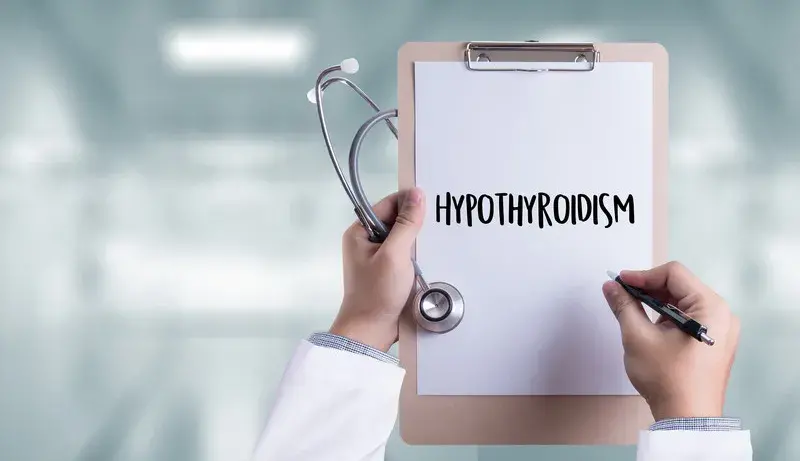Hypothyroidism is a condition that occurs when your body doesn’t produce enough thyroid hormones. The thyroid is a small, butterfly-shaped organ that resides at the base of your neck and releases hormones that help your body regulate metabolism. The thyroid gland is responsible for providing energy to nearly every organ in the body and controls functions like how your heart beats and digestive system functions. Without the right amount of thyroid hormones, your body’s natural functions begin to slow down. Also called underactive thyroid, hyperthyroidism affects women (above 60 years) more frequently than men. Reports from the American Thyroid Association (ATA) suggest that about 20 million Americans suffer from some form of thyroid disease. It is estimated that up to 60 percent of people with thyroid disease are quite unaware about their condition.
Hypothyroidism upsets the normal balance of chemical reactions in your body. In most cases, the symptoms of this condition usually develop very slowly and it can take years for them to appear. Even when the symptoms do occur, some are quite similar or mimic those of other diseases, such as fibromyalgia and rheumatoid arthritis. If left untreated, this condition can lead to many other health problems, such as goiter, obesity, joint pain, infertility and heart disease.
Billing and coding for this disorder is quite challenging, as there are several applicable rules. For accurate clinical documentation of this disorder, most endocrinologists rely on the services of reliable medical billing outsourcing companies.
What Are the Initial Signs and Symptoms?
The initial signs and symptoms associated with hypothyroidism vary from one person to another and are quite difficult to identify. The severity of the condition depends on the type of hormone deficiency and when the signs and symptoms appear. Weight gain and fatigue are some of the early symptoms one may notice. But, as you age, more symptoms related to your thyroid tend to appear. Some of the most common signs and symptoms include –
- Fatigue and depression
- Weight gain
- Muscle weakness
- Feeling cold
- Dry skin
- Constipation
- Slowed heart rate
- Puffy, sensitive face
- Pain and stiffness in your joints
- Muscle stiffness, aches, and tenderness
- Impaired memory
- Hoarseness
- Fertility difficulties or menstrual changes
- Elevated blood cholesterol
- Dry, thinning hair
- Decreased sweating
How to Diagnose and Document Underactive Thyroid
Since, hypothyroidism is more prevalent among older women, most physicians recommend screening for the condition during routine annual physical examination. Some physicians also recommend pregnant women to be tested for this condition.
As part of the initial diagnosis, physicians will conduct a thorough physical exam and medical history wherein they will check for physical signs of hypothyroidism, including – dry skin, swelling, slowed reflexes and slow heart rate. In addition, physicians will enquire about other potential symptoms such as fatigue, depression or constipation that the patients may have been experiencing.
Blood tests are the only way to reliably confirm a diagnosis of hypothyroidism. Physicians recommend one or more blood tests such as – thyroid stimulating hormone (TSH) test, T4, T3, and other thyroid antibody tests to check the thyroid functions. Generally, physicians check the amount of TSH in the blood first. TSH is a hormone made in the pituitary gland that notifies the thyroid how much T4 and T3 to make. If these tests show an elevated thyroid-stimulating hormone (TSH) and low levels of thyroid hormones, like free T4, total T3, or free T3, it may be an indication that you have hypothyroidism or an underactive thyroid.
TSH tests play an important role in managing hypothyroidism and help physicians determine the right dosage of medication, both initially and over time. In addition, TSH tests are used to diagnose a condition called “subclinical hypothyroidism”, which usually causes no outward signs or symptoms. In this condition, you have normal blood levels of triiodothyronine and thyroxine, but higher than normal levels of TSH. Standard treatment for hypothyroidism involves daily use of the synthetic thyroid hormone levothyroxine (Levothroid, Synthroid, others). This oral medication restores adequate hormone levels, reversing the signs and symptoms of hypothyroidism.
Medical Codes to Use
Endocrinology medical coding involves the use of specific ICD-10 codes to document any such conditions, including hypothyroidism. ICD-10-CM codes used to indicate a diagnosis of hypothyroidism include –
- E03 – Other hypothyroidism
- E03.0 – Congenital hypothyroidism with diffuse goiter
- E03.1 – Congenital hypothyroidism without goiter
- E03.2 – Hypothyroidism due to medicaments and other exogenous substances
- E03.3 – Post infectious hypothyroidism
- E03.4 – Atrophy of thyroid (acquired)
- E03.5 – Myxedema coma
- E03.8 – Other specified hypothyroidism
- E03.9 – Hypothyroidism, unspecified
Hypothyroidism is a lifelong condition. There is no way to prevent hypothyroidism, but people who have a high risk of thyroid problems, (for example, women during pregnancy) should check with their doctor about the need for additional iodine. For many people, medication reduces or alleviates symptoms. A healthy lifestyle – incorporating nutritious food and moderate exercise along with correct intake of medications can help people better manage hypothyroidism.




